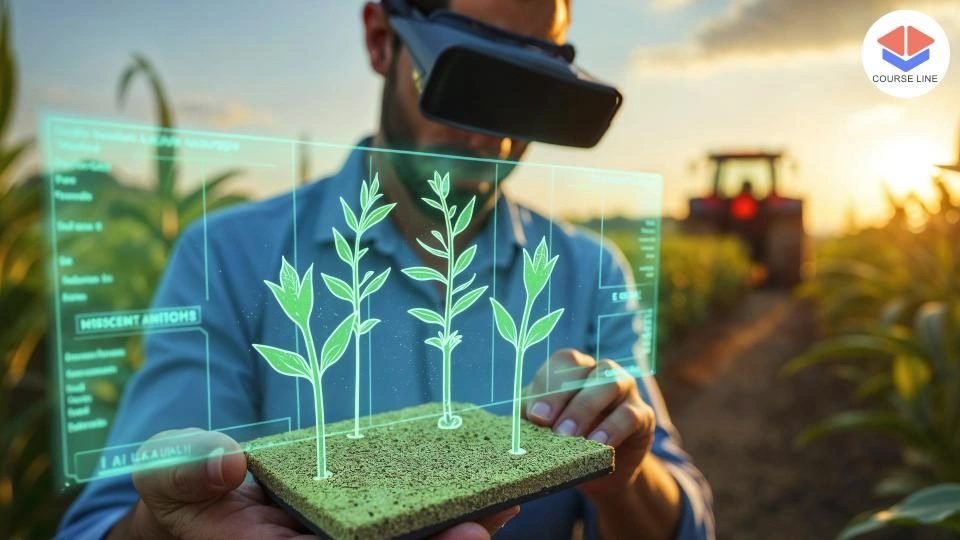Course Features
Price
Study Method
Online | Self-paced
Course Format
Reading Material - PDF, article
Duration
9 hours, 5 minutes
Qualification
No formal qualification
Certificate
At completion
Additional info
Coming soon
- Share
Overview
The "Crop Production and Management Level 3 Advanced Diploma" offers a comprehensive curriculum that blends theory with hands-on applications, providing students with the skills needed to excel in modern agriculture. This course begins with an introduction to advanced crop production, emphasizing the significance of sustainable agricultural practices and the integration of technology to enhance crop management. Students will explore various soil health and fertility management techniques, including soil composition, nutrient management, organic and inorganic fertilizers, and soil improvement strategies to ensure optimal crop growth.
In-depth coverage of advanced crop varieties and genetics follows, where students will learn about plant breeding techniques, hybridization, genetic modification, and how to develop disease- and pest-resistant crops. The course also delves into precision farming and technology integration, including the use of drones, remote sensing, data analytics, automated irrigation systems, and other smart farming tools that allow for more efficient and environmentally sustainable farming practices.
A significant focus is placed on integrated pest and disease management strategies. Students will gain practical knowledge on identifying crop pests and diseases and learn about biological, chemical, and cultural pest control methods. Additionally, the course includes comprehensive lessons on irrigation and water management, emphasizing water conservation practices like drip irrigation and rainwater harvesting techniques.
Post-harvest handling and storage practices are another key area of study, with students learning about the importance of proper harvesting techniques, storage facilities, pest management during storage, and value addition techniques for agricultural produce. The course also covers crop rotation, diversification, and the benefits of intercropping systems for sustainability and better soil health.
Adapting to climate change and creating climate-resilient farming strategies is an essential part of the program. Students will explore how to select crops for climate resilience and learn disaster preparedness strategies for farms. Business and entrepreneurship skills are developed through lessons on market analysis, supply chain management, financial management, and sustainable marketing practices, all crucial for operating a successful farm or agribusiness.
Finally, the course highlights the role of research and innovation in crop production, addressing global agricultural challenges and fostering innovation in crop breeding and production techniques. Ethical and environmental considerations in agriculture are also covered, with an emphasis on organic farming, agroecology, and biodiversity conservation, ensuring that students are prepared for the evolving demands of the agricultural industry.
Who is this course for?
The "Crop Production and Management Level 3 Advanced Diploma" offers a comprehensive curriculum that blends theory with hands-on applications, providing students with the skills needed to excel in modern agriculture. This course begins with an introduction to advanced crop production, emphasizing the significance of sustainable agricultural practices and the integration of technology to enhance crop management. Students will explore various soil health and fertility management techniques, including soil composition, nutrient management, organic and inorganic fertilizers, and soil improvement strategies to ensure optimal crop growth.
In-depth coverage of advanced crop varieties and genetics follows, where students will learn about plant breeding techniques, hybridization, genetic modification, and how to develop disease- and pest-resistant crops. The course also delves into precision farming and technology integration, including the use of drones, remote sensing, data analytics, automated irrigation systems, and other smart farming tools that allow for more efficient and environmentally sustainable farming practices.
A significant focus is placed on integrated pest and disease management strategies. Students will gain practical knowledge on identifying crop pests and diseases and learn about biological, chemical, and cultural pest control methods. Additionally, the course includes comprehensive lessons on irrigation and water management, emphasizing water conservation practices like drip irrigation and rainwater harvesting techniques.
Post-harvest handling and storage practices are another key area of study, with students learning about the importance of proper harvesting techniques, storage facilities, pest management during storage, and value addition techniques for agricultural produce. The course also covers crop rotation, diversification, and the benefits of intercropping systems for sustainability and better soil health.
Adapting to climate change and creating climate-resilient farming strategies is an essential part of the program. Students will explore how to select crops for climate resilience and learn disaster preparedness strategies for farms. Business and entrepreneurship skills are developed through lessons on market analysis, supply chain management, financial management, and sustainable marketing practices, all crucial for operating a successful farm or agribusiness.
Finally, the course highlights the role of research and innovation in crop production, addressing global agricultural challenges and fostering innovation in crop breeding and production techniques. Ethical and environmental considerations in agriculture are also covered, with an emphasis on organic farming, agroecology, and biodiversity conservation, ensuring that students are prepared for the evolving demands of the agricultural industry.
Requirements
The "Crop Production and Management Level 3 Advanced Diploma" offers a comprehensive curriculum that blends theory with hands-on applications, providing students with the skills needed to excel in modern agriculture. This course begins with an introduction to advanced crop production, emphasizing the significance of sustainable agricultural practices and the integration of technology to enhance crop management. Students will explore various soil health and fertility management techniques, including soil composition, nutrient management, organic and inorganic fertilizers, and soil improvement strategies to ensure optimal crop growth.
In-depth coverage of advanced crop varieties and genetics follows, where students will learn about plant breeding techniques, hybridization, genetic modification, and how to develop disease- and pest-resistant crops. The course also delves into precision farming and technology integration, including the use of drones, remote sensing, data analytics, automated irrigation systems, and other smart farming tools that allow for more efficient and environmentally sustainable farming practices.
A significant focus is placed on integrated pest and disease management strategies. Students will gain practical knowledge on identifying crop pests and diseases and learn about biological, chemical, and cultural pest control methods. Additionally, the course includes comprehensive lessons on irrigation and water management, emphasizing water conservation practices like drip irrigation and rainwater harvesting techniques.
Post-harvest handling and storage practices are another key area of study, with students learning about the importance of proper harvesting techniques, storage facilities, pest management during storage, and value addition techniques for agricultural produce. The course also covers crop rotation, diversification, and the benefits of intercropping systems for sustainability and better soil health.
Adapting to climate change and creating climate-resilient farming strategies is an essential part of the program. Students will explore how to select crops for climate resilience and learn disaster preparedness strategies for farms. Business and entrepreneurship skills are developed through lessons on market analysis, supply chain management, financial management, and sustainable marketing practices, all crucial for operating a successful farm or agribusiness.
Finally, the course highlights the role of research and innovation in crop production, addressing global agricultural challenges and fostering innovation in crop breeding and production techniques. Ethical and environmental considerations in agriculture are also covered, with an emphasis on organic farming, agroecology, and biodiversity conservation, ensuring that students are prepared for the evolving demands of the agricultural industry.
Career path
The "Crop Production and Management Level 3 Advanced Diploma" offers a comprehensive curriculum that blends theory with hands-on applications, providing students with the skills needed to excel in modern agriculture. This course begins with an introduction to advanced crop production, emphasizing the significance of sustainable agricultural practices and the integration of technology to enhance crop management. Students will explore various soil health and fertility management techniques, including soil composition, nutrient management, organic and inorganic fertilizers, and soil improvement strategies to ensure optimal crop growth.
In-depth coverage of advanced crop varieties and genetics follows, where students will learn about plant breeding techniques, hybridization, genetic modification, and how to develop disease- and pest-resistant crops. The course also delves into precision farming and technology integration, including the use of drones, remote sensing, data analytics, automated irrigation systems, and other smart farming tools that allow for more efficient and environmentally sustainable farming practices.
A significant focus is placed on integrated pest and disease management strategies. Students will gain practical knowledge on identifying crop pests and diseases and learn about biological, chemical, and cultural pest control methods. Additionally, the course includes comprehensive lessons on irrigation and water management, emphasizing water conservation practices like drip irrigation and rainwater harvesting techniques.
Post-harvest handling and storage practices are another key area of study, with students learning about the importance of proper harvesting techniques, storage facilities, pest management during storage, and value addition techniques for agricultural produce. The course also covers crop rotation, diversification, and the benefits of intercropping systems for sustainability and better soil health.
Adapting to climate change and creating climate-resilient farming strategies is an essential part of the program. Students will explore how to select crops for climate resilience and learn disaster preparedness strategies for farms. Business and entrepreneurship skills are developed through lessons on market analysis, supply chain management, financial management, and sustainable marketing practices, all crucial for operating a successful farm or agribusiness.
Finally, the course highlights the role of research and innovation in crop production, addressing global agricultural challenges and fostering innovation in crop breeding and production techniques. Ethical and environmental considerations in agriculture are also covered, with an emphasis on organic farming, agroecology, and biodiversity conservation, ensuring that students are prepared for the evolving demands of the agricultural industry.
-
- Understanding the Importance of Advanced Crop Production 00:10:00
- Sustainable Agriculture Practices 00:10:00
- Integration of Technology in Crop Management 00:10:00
-
- Soil Composition and Structure 00:10:00
- Soil Nutrients and Micronutrients 00:10:00
- Soil Testing and Analysis 00:10:00
- Organic and Inorganic Fertilizers 00:10:00
- Soil Health Improvement Strategies 00:10:00
- Plant Breeding Techniques 00:10:00
- Hybridization and Selection 00:10:00
- Genetic Modification in Crops 00:10:00
- Disease and Pest Resistance in Crops 00:10:00
- Identification of Common Crop Pests and Diseases 00:10:00
- Biological, Chemical, and Cultural Pest Management 00:10:00
- Pest-Resistant Crop Varieties 00:10:00
- Disease-Resistant Crop Varieties 00:10:00
- Importance of Proper Harvesting Techniques 00:10:00
- Storage Facilities and Conditions 00:10:00
- Pest Management in Stored Crops 00:10:00
- Value Addition and Processing of Agricultural Produce 00:10:00
- Understanding Climate Change Impacts 00:10:00
- Adaptation Strategies for Changing Climate 00:00:00
- Crop Selection for Resilience 00:10:00
- Disaster Preparedness and Risk Reduction 00:10:00
- Current Trends in Agricultural Research 00:10:00
- Participatory Research and Farmer Collaboration 00:10:00
- Innovation in Crop Breeding and Production Techniques 00:10:00
- Role of Agriculture in Addressing Global Challenges 00:10:00
- Exam of Crop Production and Management Level 3 Advanced Diploma 00:50:00

No Reviews found for this course.
Is this certificate recognized?
Yes, our premium certificate and transcript are widely recognized and accepted by embassies worldwide, particularly by the UK embassy. This adds credibility to your qualification and enhances its value for professional and academic purposes.
I am a beginner. Is this course suitable for me?
Yes, this course is designed for learners of all levels, including beginners. The content is structured to provide step-by-step guidance, ensuring that even those with no prior experience can follow along and gain valuable knowledge.
I am a professional. Is this course suitable for me?
Yes, professionals will also benefit from this course. It covers advanced concepts, practical applications, and industry insights that can help enhance existing skills and knowledge. Whether you are looking to refine your expertise or expand your qualifications, this course provides valuable learning.
Does this course have an expiry date?
No, you have lifetime access to the course. Once enrolled, you can revisit the materials at any time as long as the course remains available. Additionally, we regularly update our content to ensure it stays relevant and up to date.
How do I claim my free certificate?
I trust you’re in good health. Your free certificate can be located in the Achievement section. The option to purchase a CPD certificate is available but entirely optional, and you may choose to skip it. Please be aware that it’s crucial to click the “Complete” button to ensure the certificate is generated, as this process is entirely automated.
Does this course have assessments and assignments?
Yes, the course includes both assessments and assignments. Your final marks will be determined by a combination of 20% from assignments and 80% from assessments. These evaluations are designed to test your understanding and ensure you have grasped the key concepts effectively.
Is this course accredited?
We are a recognized course provider with CPD, UKRLP, and AOHT membership. The logos of these accreditation bodies will be featured on your premium certificate and transcript, ensuring credibility and professional recognition.
Will I receive a certificate upon completion?
Yes, you will receive a free digital certificate automatically once you complete the course. If you would like a premium CPD-accredited certificate, either in digital or physical format, you can upgrade for a small fee.
Course Features
Price
Study Method
Online | Self-paced
Course Format
Reading Material - PDF, article
Duration
9 hours, 5 minutes
Qualification
No formal qualification
Certificate
At completion
Additional info
Coming soon
- Share
Computer Science Level 8 Advanced Diploma
Course Line255£490.00Original price was: £490.00.£14.99Current price is: £14.99.Football Coaching Level 5 Advanced Diploma
Course Line239£490.00Original price was: £490.00.£14.99Current price is: £14.99.Reiki Mastery: Elevate Your Healing Practice
Course Line238£490.00Original price was: £490.00.£14.99Current price is: £14.99.





